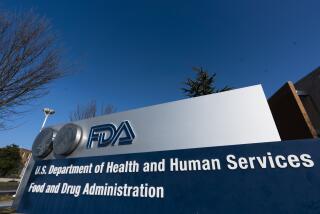New guidelines: Labs should report incidental genetic disease risk
- Share via
Laboratories performing exome or genomic sequencing tests that help physicians diagnose and treat disease should routinely look for a welter of unrelated genetic variations that are known to be associated with illness and should tell physicians if they’ve found them, a first-of-its-kind set of guidelines recommends.
The new guidelines, released Thursday by the American College of Genetics and Genomics, represent a first effort to navigate the ethical challenges of new genomic technology and offer patients, doctors and laboratories a framework for making decisions about what information should be shared when genetic scans are performed.
Among the genetic variations for which sequencing labs should look and report results:
-- The BRCA-1 and BRCA 2 gene, associated with extremely high risk of breast and ovarian cancers;
-- Those associated with a wide range of syndromes that raise the risk of developing cancers of the digestive tract, including Lynch syndrome, Peutz-Jeghers syndrome, familial adenomatous polyposis (between 2% and 7% of these cancers are attributable to inherited risk);
-- The gene associated with Li-Fraumeni syndrome, a rare disorder associated with high rates of cancer, especially in children and young adults;
-- Those linked to Von Hippel Lindau syndrome, an inherited propensity to develop tumors and cysts, cancerous as well as benign, throughout the body;
-- Those associated with multiple endocrine neoplasia, types 1 and 2;
-- Genes linked to familial medullary thyroid cancer, retinoblastoma and tuberous sclerosis.
The working group’s efforts focused on a problem -- or opportunity, depending on how you see it -- that has come as genomic analyses have become more commonly used and more sophisticated and as research has uncovered the genetic underpinnings of more and more diseases. When a physician orders genomic sequencing to aid in treatment of cancer or cardiac disease, laboratories are well-positioned to detect genetic variations linked to other diseases, and sometimes find them incidentally.
These findings are called “incidental,” since they were found in thecourse of looking for something else.
A year in the making, the new guidelines assert that when a known genetic variation is clearly linked to heightened disease risk, when symptoms may not become evident for years, and when knowledge of that risk could prompt potentially life-saving steps, a genetic lab has a duty to report them to a physician. A physician, in turn, should reveal these “incidental findings” to the affected patient, whether he or she wants them or not.
The working group decided that even children, who may not have the emotional or cognitive maturity to understand the implications of such findings, should receive notice when they have been found. The working group did not favor offering adult patients the option of not receiving notice of “incidental findings.”
“We recognize that this may be seen to violate existing ethical norms regarding the patient’s autonomy and ‘right not to know’ genetic risk information,” the panel acknowledged. But, the group added, clinicians and laboratory personnel, “have a fiduciary duty to prevent harm by warning patients and their families about certain incidental findings.”
To draft the guidelines, the American College of Genetics and Genomics gathered a group of ethicists, geneticists, genetic counselors and molecular laboratorians to deliberate over the course of a year.
While ad hoc decisions in such matters may have been tenable in an era when only genetic specialists order such analyses, such judgments will become “increasingly unwieldy as clinical sequencing becomes more common and more commonly ordered by clinicians with varying levels of ability and experience in genetic counseling,” the panel wrote.
Since future genetic analyses may well turn up such incidental findings, physicians ordering them should discuss in advance with patients that possibility, the group recommended.
Incidental findings are a recognized ethical conundrum in many fields of medicine, where advancing diagnostic technology often turns up evidence of abnormality or disease that were unrelated to the problem for which the test was being performed. A 2010 study found that nearly 40% of high-tech imaging scans performed turn up some medically worrisome sign -- a solid mass, a lesion, a bulge in an artery or a tangle of nerves -- that was not the original object of concern. CT scans, particularly those of the abdomen and chest, were most likely to turn up incidental findings, the study found.
The working group chose not to recommend that incidental findings be sought or reported in routine newborn testing, in pre-conception sequencing or prenatal sequencing.
But the group acknowledged that as genetic sequencing services become cheaper and more widely available, healthy individuals will face a growing dilemma about what they do and do not want to know about their disease risk. The same force will likely prompt public health officials’ interest in using genomic sequencing to screen large populations for disease.
“The value of population screening for and prevention and health promotion raises complex questions of potential benefits as well downstream risks and costs that will need considerably more data to resolve,” the group said.
As research in genetics advances, the panel said the list of “incidental findings” for which labs should be on the lookout will require annual update.







